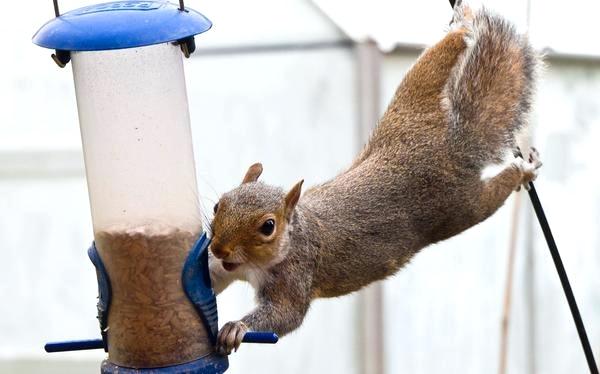When squirrels invade, many homeowners take matters into their own hands but this is not advisable. DIY squirrel control is usually dangerous to both squirrels and people and in many instances, they simply do not work. Many people resort to the use of a homemade squirrel repellent but like many store-bought repellents, the results just don’t match that of professional wildlife removal services. Continue reading to learn more.
Squirrel Behaviour in Human Spaces
When squirrels invade domestic or commercial spaces, they can inflict quite a bit of damage. They thwart bird watchers’ efforts by raiding bird feeders for seeds and nuts. This often scares the birds away and results in fewer birds arriving since the seed or nut reserves are depleted.
Squirrels are avid chewers and they are gifted with powerful front chompers specifically designed by nature for this purpose. These powerful teeth can do significant damage to buildings, especially in the attics, a prime nesting space for wild squirrels. When squirrels chew into electrical wiring, the building becomes more prone to fire as well. The truth is though, that squirrels are not intentionally or maliciously damaging human property. They are simply doing what they need to do to survive.

Why Squirrel Repellents Should be Avoided
Despite the negative impact squirrels can have on your home, experts advise against resorting to homemade repellents. For one, they are not guaranteed to work. The user has to have good scientific knowledge and ensure that the right quantity is used in order for the solution to be at its optimum strength. Users of homemade squirrel repellents also have to contend with nature. Rain and wind often reduce or remove the repellent when it is used outdoors, necessitating very frequent application.
Additionally, some of these homemade repellents contain chemical components that are harmful to people, squirrels, and other animals. As desperate as you may be to get squirrels off your property, risking the health of the animals as well as yours is simply not worth it. These are some of the more common homemade methods for squirrel removal, with less than stellar results.
Chilli Pepper and other Peppery Substances
Chilli peppers are often used as a DIY squirrel repellent because squirrels don’t like how it tastes. Users coat plants and fruits that squirrels feed on with the spicy substance. Sadly sometimes squirrels will rub paws that are coated with substance in their eyes and this can cause blindness. A blind squirrel’s chances of surviving on its own are significantly lowered. Hot sauce and other types of peppers are also used in a similar way.
Moth Balls
The idea behind the use of mothballs is that the smell will keep squirrels away. They are usually used in attics and must be used in large enough quantities to ensure that the smell they create is pungent enough to discourage squirrels from entering the space. Mothballs can be toxic to other animals and children. Toddlers or pets may be exposed to mothball poisoning by accidentally ingesting the mothball that has been placed to repel squirrels.
Baby Powder
Squirrels do not like the smell of baby powder and so some people sprinkle it in the area they want the animals to avoid. One problem with baby powder is that it is easily washed away by rain or swept away by the wind. Additionally, before you think of using baby powder consider the fact that some brands have ingredients make them unsuitable for babies which means that they are also likely to be harmful to squirrel health as well.
The Best Way to Tackle a Squirrel Invasion
When faced with a squirrel invasion, avoid the DIY squirrel repellent mistakes discussed above. Instead, seek the help of expert animal control teams like those at Skedaddle. Skedaddles’ animal control technicians will assess your squirrel situation and implement safe, humane and effective methods of removing the animals and keeping them away for good.



